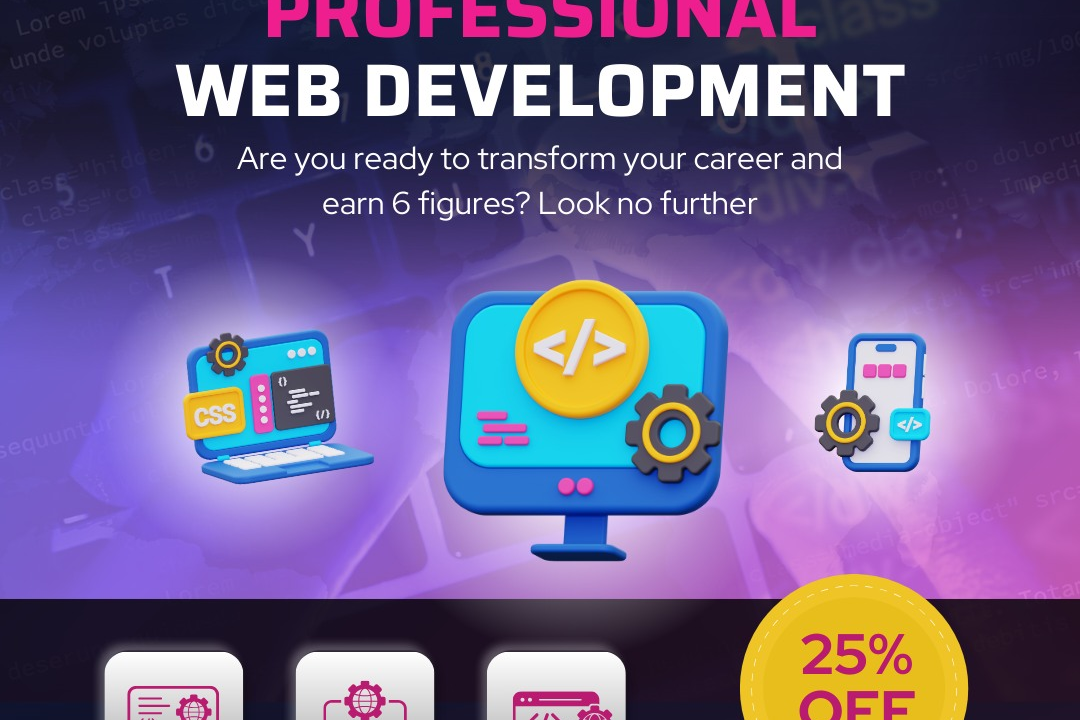selenium training in hyderabad KPHB
Selenium training in KPHB, Hyderabad, offers a comprehensive curriculum designed for individuals eag
selenium training in hyderabad KPHB
Selenium training in KPHB, Hyderabad, is essential for aspiring software testers and developers looking to excel in the field of automation testing. With the increasing demand for high-quality web applications, mastering Selenium equips participants with the skills to automate testing processes, significantly improving efficiency and accuracy. The training provides in-depth knowledge of testing frameworks, practical exposure to real-world projects, and insights into best practices, making it invaluable for enhancing career prospects in software quality assurance. By learning Selenium, individuals can stay competitive in the fast-evolving tech landscape and contribute effectively to their organizations' testing efforts.
To Download Our Brochure: https://www.justacademy.co/download-brochure-for-free
Message us for more information: +91 9987184296
Selenium training in KPHB, Hyderabad, is essential for aspiring software testers and developers looking to excel in the field of automation testing. With the increasing demand for high quality web applications, mastering Selenium equips participants with the skills to automate testing processes, significantly improving efficiency and accuracy. The training provides in depth knowledge of testing frameworks, practical exposure to real world projects, and insights into best practices, making it invaluable for enhancing career prospects in software quality assurance. By learning Selenium, individuals can stay competitive in the fast evolving tech landscape and contribute effectively to their organizations' testing efforts.
Course Overview
The “Selenium Training in Hyderabad KPHB” course is designed to equip participants with comprehensive knowledge and hands-on experience in automated testing using the Selenium framework. This training covers essential topics such as Selenium WebDriver, TestNG, Maven, and integration with various programming languages, enabling learners to build robust test automation scripts. The curriculum emphasizes real-time projects and practical applications, ensuring that students can effectively implement testing strategies in live scenarios. Whether you're a beginner or an experienced tester, this course provides the tools and insights necessary to advance in the field of software testing, meet industry demands, and enhance your career prospects.
Course Description
The “Selenium Training in Hyderabad KPHB” course offers an in-depth exploration of the Selenium framework, tailored for both beginners and experienced testers looking to enhance their automation skills. Participants will gain a solid understanding of Selenium WebDriver, TestNG, and Maven, while working on real-time projects that simulate industry scenarios. The course emphasizes practical application and hands-on experience, ensuring students can develop effective automated testing scripts and strategies. With expert instructors guiding them, learners will also explore best practices and troubleshooting techniques, preparing them for successful careers in software testing and automation. Join us to become proficient in one of the most sought-after skills in the tech industry.
Key Features
1 - Comprehensive Tool Coverage: Provides hands-on training with a range of industry-standard testing tools, including Selenium, JIRA, LoadRunner, and TestRail.
2) Practical Exercises: Features real-world exercises and case studies to apply tools in various testing scenarios.
3) Interactive Learning: Includes interactive sessions with industry experts for personalized feedback and guidance.
4) Detailed Tutorials: Offers extensive tutorials and documentation on tool functionalities and best practices.
5) Advanced Techniques: Covers both fundamental and advanced techniques for using testing tools effectively.
6) Data Visualization: Integrates tools for visualizing test metrics and results, enhancing data interpretation and decision-making.
7) Tool Integration: Teaches how to integrate testing tools into the software development lifecycle for streamlined workflows.
8) Project-Based Learning: Focuses on project-based learning to build practical skills and create a portfolio of completed tasks.
9) Career Support: Provides resources and support for applying learned skills to real-world job scenarios, including resume building and interview preparation.
10) Up-to-Date Content: Ensures that course materials reflect the latest industry standards and tool updates.
Benefits of taking our course
Functional Tools
1 - Selenium WebDriver
Selenium WebDriver is the core component of the Selenium suite used for automating web applications. It allows testers to write scripts in various programming languages, such as Java, Python, C#, and Ruby. With its ability to interact with web elements easily, WebDriver enables testers to simulate user actions like clicking buttons, entering text, and navigating through web pages. The support for multiple browsers, including Chrome, Firefox, and Safari, ensures comprehensive testing across diverse environments.
2) Selenium IDE
Selenium IDE (Integrated Development Environment) is a user friendly tool designed for beginners in test automation. This record and playback tool allows users to create automated tests without writing code. It features a simple interface that records user interactions with web applications and converts them into test scripts. Students will benefit from learning how to use this tool to quickly develop tests and then enhance them with programming constructs as they advance their skills.
3) TestNG
TestNG is a testing framework inspired by JUnit and NUnit but redefined to make test configuration easier. It provides advanced features, such as annotations, data driven testing, parallel execution, and test dependency management. Through the comprehensive use of TestNG, students can structure their automation tests efficiently, allowing for better organization and execution of test cases. Learning to integrate TestNG with Selenium enhances their testing capabilities and fosters higher quality software development.
4) Maven
Maven is a build automation tool primarily used for Java projects but applicable in various technology stacks. Students will learn how to use Maven to manage project dependencies, automate the build process, and simplify project configuration. By leveraging Maven's capabilities, learners can ensure that their testing environment is consistent and tailored to their specific requirements. Understanding Maven significantly contributes to maintaining a streamlined workflow in automating tests with Selenium.
5) Git
Git is a version control system that enables developers and testers to collaborate seamlessly. It allows students to track changes in their test scripts, manage different versions of their projects, and coordinate work with team members effectively. During the Selenium training, participants will learn how to utilize Git commands for cloning repositories, making commits, and branching, which are crucial for collaborative projects. Mastery of Git sets a solid foundation for working in team environments where ongoing collaboration and version tracking are paramount.
6) Jenkins
Jenkins is an open source automation server widely used for continuous integration and continuous deployment (CI/CD) practices. In the Selenium training program, students will learn how to configure Jenkins to automate the execution of their Selenium tests at regular intervals or upon specific triggers, such as code changes. Understanding Jenkins enhances their ability to implement automated testing in a real world CI/CD pipeline, ensuring quicker feedback and higher software quality.
7) Cucumber
Cucumber is a tool that supports Behavior Driven Development (BDD), allowing testers to write tests in natural language which are more understandable to non technical stakeholders. In this training, students will learn how to integrate Cucumber with Selenium to enhance collaboration between developers, testers, and business analysts. By understanding how to define features and scenarios in Gherkin syntax, learners can create acceptance criteria that bridge the gap between technical implementation and business requirements.
8) Page Object Model (POM)
The Page Object Model is a design pattern that enhances test maintenance and reduces code duplication. In the Selenium training program, students will learn how to implement the POM design pattern to create an interface for each web page, encapsulating the page's elements and actions. This approach promotes a clear separation between the test logic and the page structure, making it easier to manage changes in the application UI without affecting the test scripts significantly.
9) API Testing with RestAssured
As web applications become increasingly interconnected, understanding API testing is essential. The training will cover RestAssured, a popular Java library for testing RESTful APIs. Students will learn how to verify responses, validate status codes, and perform data driven testing on APIs. This knowledge equips learners with the ability to ensure that the backend services are functioning correctly alongside the frontend tests, providing a more holistic approach to software testing.
10) Performance Testing with JMeter
Incorporating performance testing into the curriculum ensures that students understand the importance of application responsiveness under load. JMeter is a widely used tool for performance testing, and learners will gain insights into how to simulate multiple users and analyze the performance metrics of web applications. By combining performance and functional testing with Selenium, students will develop a comprehensive testing strategy that identifies potential bottlenecks and enhances user experience.
11 - Cross Browser Testing
Cross browser testing is crucial in ensuring that web applications function correctly across different browsers and devices. The training will emphasize the importance of testing applications on various combinations of browsers, operating systems, and devices. Students will learn how to utilize Selenium Grid and cloud based testing services to run parallel tests, thus saving time and increasing test coverage. This knowledge is essential for delivering a consistent user experience.
12) Handling Dynamic Elements
Many modern web applications feature dynamic elements that may change based on user interactions or AJAX calls. Students will learn strategies to handle such cases effectively in their Selenium tests, including the use of explicit waits, implicit waits, and fluent waits. These techniques ensure that tests are robust and less prone to failure due to timing issues, ultimately improving reliability.
13) Error Handling and Logging
Robust test automation requires effective error handling and logging practices. In this training, students will explore various techniques for managing exceptions during test execution and how to implement logging frameworks like Log4j. By integrating error handling and logging into their test scripts, learners can quickly diagnose issues and maintain the quality of their automated tests.
14) Test Data Management
Managing test data is crucial for effective test automation. Students will learn how to create, manipulate, and manage test data using various techniques, including using external data sources (like databases and CSV files) and implementing data driven testing approaches. Understanding how to work with test data allows for more comprehensive test scenarios and promotes higher test quality.
15) Integrating Automation with Development Workflows
In today's fast paced development environments, integration between development and testing is essential. The training will cover how to integrate Selenium automation tests within Agile workflows, DevOps practices, and release cycles. Students will learn about best practices for continuously running tests, obtaining quick feedback, and facilitating a culture of quality throughout the software development lifecycle.
16) Interview Preparation and Real World Projects
To prepare students for the job market, the training will also focus on interview preparation techniques specific to automation testing roles, including common interview questions and practical problem solving exercises. Moreover, students will work on real world projects that simulate actual job scenarios, allowing them to showcase their expertise in automation testing and build confidence as they enter the workforce.
Browse our course links : https://www.justacademy.co/all-courses
To Join our FREE DEMO Session:
This information is sourced from JustAcademy
Contact Info:
Roshan Chaturvedi
Message us on Whatsapp:
Email id: info@justacademy.co












